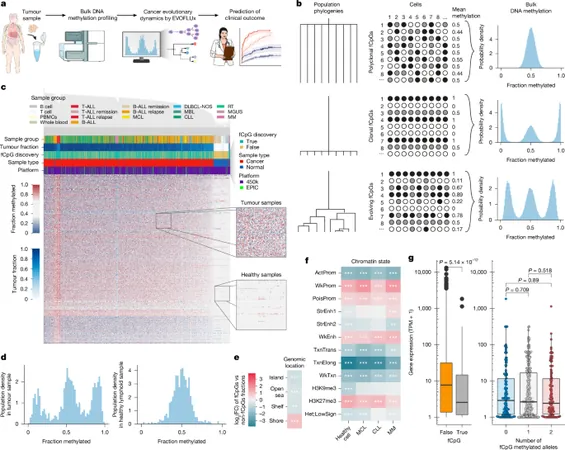
Revolutionary Insights: How DNA Methylation Reveals Cancer's Evolution
2025-09-10
Author: Yan
Unlocking Cancer's Code: The New Frontier of DNA Methylation Research
Recent groundbreaking research delves into the intricate world of DNA methylation, unveiling its potential to track cancer evolution at an unprecedented clinical scale. This revelation opens up new avenues for understanding how cancer progresses and how it can potentially be treated.
Data Collection and Quality Control: A Beacon of Precision
The study meticulously compiled and processed a whopping 2,430 DNA methylation datasets, derived from both normal and cancerous lymphoid cells. The data includes healthy control samples from various B and T cell types, alongside an extensive array of tumor samples encompassing different leukemia and lymphoma types.
Cutting-Edge Methodology: Ensuring Flawless Data Integrity
Utilizing advanced software and stringent quality control measures, researchers evaluated and filtered the data to ensure that only the highest quality samples were used. This rigorous process included the removal of samples with abnormal methylation distributions, thus ensuring that the findings would be robust and reliable.
Fluctuating CpGs: A New Metric for Cancer Monitoring
One of the standout features of this research is the identification of fluctuating CpG sites (fCpGs)—those that vary significantly in methylation across cancer patients. These markers could serve as vital indicators for monitoring cancer progression and response to treatment.
Beyond Genetic Influence: Dissecting the Complexity of fCpGs
Interestingly, the study found that these fCpGs are not influenced by common genetic variations, suggesting they reflect dynamic changes in cancer cells rather than static genetic information. This insight marks a significant shift in understanding how cancer evolves at the cellular level.
Next-Generation Sequencing: The Future of Cancer Research
Researchers employed long-read nanopore sequencing techniques to validate their findings further. This innovative approach allows for a deeper examination of DNA methylation patterns, enhancing the accuracy and reliability of their analyses.
Implications for Patient Care: Toward Personalized Medicine
The implications of these findings are profound. By tracking the fluctuations in DNA methylation, clinicians could gain invaluable insights into an individual’s cancer progression, ultimately paving the way for more personalized treatment strategies.
Conclusion: A New Era in Cancer Research
This cutting-edge research not only enhances our understanding of cancer evolution but also sets the stage for future studies aimed at utilizing DNA methylation as a powerful tool in cancer diagnostics and therapeutics. As the field advances, the hope for more effective and tailored cancer treatments becomes increasingly attainable.



 Brasil (PT)
Brasil (PT)
 Canada (EN)
Canada (EN)
 Chile (ES)
Chile (ES)
 Česko (CS)
Česko (CS)
 대한민국 (KO)
대한민국 (KO)
 España (ES)
España (ES)
 France (FR)
France (FR)
 Hong Kong (EN)
Hong Kong (EN)
 Italia (IT)
Italia (IT)
 日本 (JA)
日本 (JA)
 Magyarország (HU)
Magyarország (HU)
 Norge (NO)
Norge (NO)
 Polska (PL)
Polska (PL)
 Schweiz (DE)
Schweiz (DE)
 Singapore (EN)
Singapore (EN)
 Sverige (SV)
Sverige (SV)
 Suomi (FI)
Suomi (FI)
 Türkiye (TR)
Türkiye (TR)
 الإمارات العربية المتحدة (AR)
الإمارات العربية المتحدة (AR)